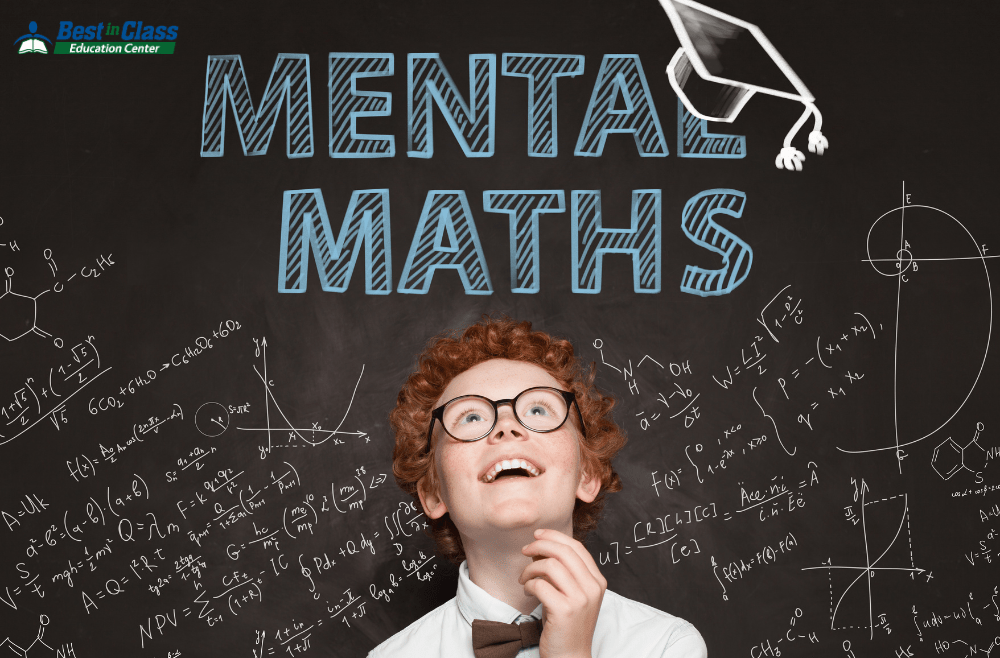What Is Mental Math? How Foundational Math Helps Children Improve Their Math Grades

When you help your child with math homework, you may frequently remind them to show their work. In fact, if you remember your childhood, you may have lost a few points on your own math homework for failing to show your work. Although math teachers have a good reason for the policy of demonstrating processes, mastering mental math is also essential to solving problems with greater ease and accuracy, thereby improving math grades.
What Is Mental Math?
Mental math is calculating math problems in your head, also known as math fact fluency. When you do mental math, you’re not counting on your fingers, writing it out with a pencil, or using a calculator. If a child can master foundational mental-math tasks, they will learn advanced math more easily. Developing a quick mental calculator will also benefit them when they need to use math in everyday life to make purchases, determine a discount, or help you plan their next birthday bash.
What Are the Benefits of Practicing Mental Math?
Mental Math in the Classroom
Mental math is essential in math class for the same reason that sight words are helpful in reading. By memorizing the most common combinations of numbers, your child can do math more efficiently and solve more complex math problems.
Imagine that your child is learning to do the following algebra problem:
4x – 10 = 14
Your child’s teacher may explain how to solve the problem:
- First, add 10 to both sides of the equation (your child will use mental math to determine that 10 + 14 = 24). The equation now looks like this: 4x = 24.
- Divide both sides by 4 (your child will use mental math to divide 24 by 4). x = 6.
For younger students, mental math is vital for addition, subtraction, multiplication, and division tasks. At whatever age, the more practice your child has at mental math, the more quickly and accurately they can tackle the simple calculations that make up more advanced math problems.
Mental Math in Everyday Life
But mental math isn’t just helpful at school. By practicing mental math, your child will be well-equipped to handle math in the real world now and in the future. For example, when we calculate tips at a restaurant, estimate the price of groceries as we shop, decide if a refinance makes sense, or make change, we can use mental math to get faster results.
How Can I Help My Child Improve Their Mental Math?
If your child struggles with mental math, they may struggle to master more complex math concepts as time goes on and complete their math assignments with less efficiency and accuracy. For this reason, it’s essential to help your child with mental math so that they can find math success and experience less frustration. Here are a few ways to help your child master mental math:
- Memorize simple math facts – When your child can quickly recall that 3 + 4 = 7, they can figure out 30 + 40 or 300 + 400. These skills are established through frequent practice and repetition. Flashcards, timed drills, math apps, or “beat the clock” games can build math fluency.
- Teach them to round numbers for faster calculations – 19 + 29 looks daunting, but 20 + 30 is easier. Once they figure out the rounded answer, help them adjust to get the correct answer.
- Practice number bonds – Pick a number, such as 10. Then, ask your child to name each number combination that adds up to 10 (e.g., 5 + 5, 9 + 1, 2 + 8).
- Flip the equation – Have your child solve an equation such as 1 + 1 = 2. Then, flip the equation so that they can see that 2 – 1 = 1. Along with number bonds, this will help them better understand how the numbers work.
- Practice in the real world – Take your child grocery shopping and have them help you with calculations as you shop. Depending on their age or skill level, they can add up the total or calculate the sale price of an item.
If your child struggles with math, practicing mental math is just one strategy to get them back on track. At Best in Class, we can help your child understand math concepts that will benefit them for a lifetime. Contact one of our education centers today to find out how to get started.

